

Jordan Peterson's 4 Lessons To IMPROVE YOUR LIFE & FIND PURPOSE Today. 100 Inspirational Quotes on Self-Discipline. Self-discipline; the real ‘secret’ to success.
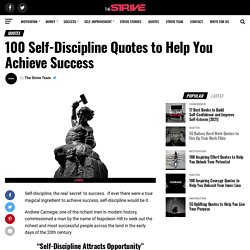
If ever there were a true magical ingredient to achieve success, self-discipline would be it. Andrew Carnegie, one of the richest men in modern history, commissioned a man by the name of Napoleon Hill to seek out the richest and most successful people across the land in the early days of the 20th century. “Self-Discipline Attracts Opportunity” Can you guess what the common denominator was in Napoleon Hill’s decades long study of what lead to success?
If you guessed self-discipline, you’d be right. In addition to such finding, self-discipline has been referenced time and time again by those who have accomplished greatly and have achieved massive success. Unfortunately, it is a truth that has also been ignored by way too many people to the detriment of their accomplishments. I am firm believer that self-discipline attracts opportunity. Self-discipline, without a doubt, leads to triumph. But don’t just take my word for it. 1. 2. 3. 4. 5. 6. 7. Reductio ad Absurdum. Reductio ad absurdum (also known as: reduce to absurdity) Description: A mode of argumentation or a form of argument in which a proposition is disproven by following its implications logically to an absurd conclusion.
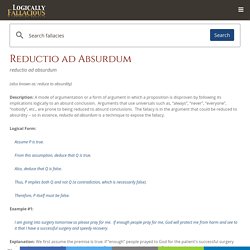
Arguments that use universals such as, “always”, “never”, “everyone”, “nobody”, etc., are prone to being reduced to absurd conclusions. Epistemology. A branch of philosophy concerned with the nature and scope of knowledge Epistemology (; from Greek ἐπιστήμη, epistēmē, meaning 'knowledge', and -logy) is the branch of philosophy concerned with the theory of knowledge.

Ontology. Parmenides was among the first to propose an ontological characterization of the fundamental nature of reality.
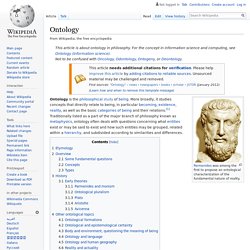
Etymology[edit] 75. Peter Sjöstedt-H // The Alchemy of Nietzsche, Panpsychism & Metaphysical Creativity. Life of Confucius. Life of Confucius – The History of K’ung the Master The life of Confucius begins with a man named K’ung Ch’iu who was born in northeastern China in 551 BC.
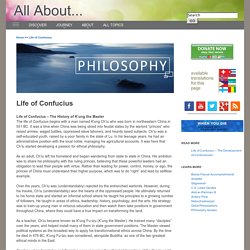
It was a time when China was being sliced into feudal states by the warlord “princes” who raised armies, waged battles, oppressed slave laborers, and heavily taxed subjects. Ch’iu was a self-educated youth, raised by a poor family in the state of Lu. In his teenage years, he had an administrative position with the local noble, managing his agricultural accounts. It was here that Ch’iu started developing a passion for ethical philosophy. As an adult, Ch’iu left his homeland and began wandering from state to state in China. Nietzsche's Superman. The concept of Superman is both the best known of Nietzsche’s philosophy but also and especially the more complex.
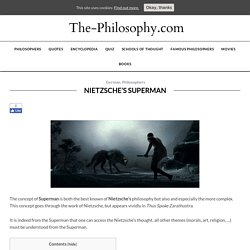
This concept goes through the work of Nietzsche, but appears vividly in Thus Spoke Zarathustra. It is indeed from the Superman that one can access the Nietzsche’s thought, all other themes (morals, art, religion, …) must be understood from the Superman. Nietzsche on Love. Your complimentary articles You’ve read one of your four complimentary articles for this month.
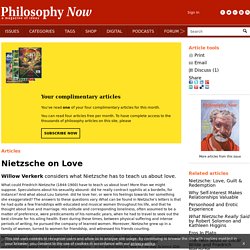
You can read four articles free per month. To have complete access to the thousands of philosophy articles on this site, please Articles Willow Verkerk considers what Nietzsche has to teach us about love. The Basics of Philosophy: A huge subject broken down into manageable chunks. Epicurus and Epicurean Philosophy. History of Philosophy without any gaps. Philosophy Made Easy. Philo of Alexandria.
1.
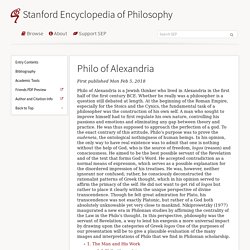
The Man and His Work 1.1 Philo Alexandrinus It is impossible to give precise dates for Philo’s birth. Portal:Philosophy - Theosopedia. Philosophies and Philosophers.
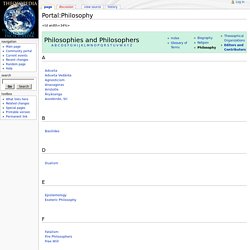
A. Thomas Aquinas on Law. Read Saint Thomas Aquinas, On Law, Morality and Politics (Hackett), xiii-xxii and 11-83.
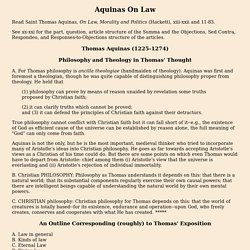
See xx-xxi for the part, question, article structure of the Summa and the Objections, Sed Contra, Respondeo, and Responses-to-Objections structure of the articles. Thomas Aquinas (1225-1274) Philosophy and Theology in Thomas' Thought A. For Thomas philosophy is ancilla theologiae (handmaiden of theology). Aquinas was first and foremost a theologian, though he was quite capable of distinguishing philosophy proper from theology. He held that (1) philosophy can prove by means of reason unaided by revelation some truths proposed by Christian faith; (2) it can clarify truths which cannot be proved; and (3) it can defend the principles of Christian faith against their detractors. 1. in general 2. the precepts 3. apprehending natural law--synderesis F. 1.
I shall deviate from this outline by reversing E-G, to which most of our time shall be devoted. Anthropomorphism. (also known as: personification) Description: The attributing of human characteristics and purposes to inanimate objects, animals, plants, or other natural phenomena, or to gods. This becomes a logical fallacy when used within the context of an argument. Logical Form: Non-human thing is described with human characteristics. Animal Cognition (Stanford Encyclopedia of Philosophy) 1. What is Animal Cognition?
Animal cognition research examines the processes used to generate adaptive or flexible behavior in animal species. Are You Able to Solve Einstein's Famous Riddle? Jstor. Pseudo-Dionysius the Areopagite (Stanford Encyclopedia of Philosophy) 1. Dionysius: Persona Since Pseudo-Dionysius represented himself as St. Dionysius the Areopagite, an Athenian member of the judicial council, the Areopagus, who was converted instantly by St. Paul, his work, strictly speaking, might be regarded as a successful “forgery”, providing him with impeccable Christian credentials that conveniently antedated Plotinus by over two hundred years. So successful was this stratagem that Dionysius acquired almost apostolic authority, giving his writings enormous influence in the Middle Ages and the Renaissance, though his views on the Trinity and Christ (e.g., his emphasis upon the single theandric activity of Christ (see Letter 4) as opposed to the later orthodox view of two activities) were not always accepted as orthodox since they required repeated defenses, for example, by John of Scythopolis and by Maximus Confessor.
It must also be recognized that “forgery” is a modern notion. 2. Plato's Timaeus (Stanford Encyclopedia of Philosophy) 1. Overview of the Dialogue The opening conversation (17a1–27d4) introduces the characters—Socrates, Timaeus, Critias and Hermocrates—and suggests that the latter three would contribute to a reply to Socrates’ speech allegedly given on the previous day, which presented an ideal political arrangement strongly reminiscent of the Republic.[3] This reply would start with an account of the creation of the universe down to the creation of human beings and, in a second step, show an ideal society in motion. Critias is meant to provide the second step with his account of a war between ancient Athens and Atlantis, the beginning of which we find in Plato’s Critias, while Timaeus is meant to deal with the first step in our dialogue. The first of the main sections of the discourse explains the existence of the universe and some of its most general features teleologically. 2. 3.
Philosophy. Core Statement: The unit can be regarded either as the limit of its relations to all other units, or as the point of origination of the unique agency or causality associated with it. Project Statement (After Aristotle, Metaphysics 987b18 & sq. HYLE 20-1 (2014): Whole-Parts Strategies in Quantum Chemistry: Some Philosophical and Mereological Lessons. Jean-Pierre Llored* Abstract: Philosophers mainly refer to quantum chemistry in order to address questions about the reducibility or autonomy of chemistry relative to quantum physics, and to argue for or against ontological emergence. To make their point, they scrutinize quantum approximations and formalisms as if they were independent of the questions at stake. This paper proposes a return to history and to the laboratory so as to emphasize how quantum chemists never cease to negotiate the relationships between a molecule, its parts, and its environment. This investigation will enable us to draw methodological conclusions about the role of history within philosophical studies, and to examine how quantum chemistry can clarify important philosophical and mereological issues related to the emergence/reduction debate, or to the way instruments and contexts are involved in the material making and the formal description of wholes and parts.
Emergent materialism. Philosophers. Great Philosophers: Hypatia. Internet Encyclopedia of Philosophy. Spinoza, Benedict De. Lucien Lévy-Bruhl. Lucien Lévy-Bruhl (10 April 1857 – 13 March 1939) was a French scholar trained in philosophy, who made contributions to the budding fields of sociology and ethnology. His primary field of study involved primitive mentality. Lévy-Bruhl was born in Paris. Aristotle Biography. The Early Years. Rules of logical philosophy.
Philosophy - The Dicipline of Reasoning, Logic, Knowlege and Truth for Rational Thinking. Philosophy. Uses and Misuses of Logic. Introduction. Critical Thinking Model 1. How are assumptions important in the critical thinking process? Critical thinking requires using logic, but logic is dependent upon accepting premises. These premises are often called assumptions. Some premises are ironclad, such as assuming that an object dropped on Earth will fall and land safe. Others are unknown. Distinguishing Between Inferences and Assumptions. Logical Arguments. The Structure of Arguments. Logical Fallacies. [L01] What is logic? Logical Deduction Important Formulas - Logical Reasoning Questions and Answers. Internet History Sourcebooks. Rules-of-reasoning. Can you solve the prisoner hat riddle? - Alex Gendler. Philosophy: Friedrich Nietzsche: Quotes on Language, Metaphor, Metaphysics, Truth, Postmodernism. Nietzsche Pictures, Biography, Beyond Good and Evil, Greeks.
The Mortality Paradox. The Simple Logical Puzzle That Shows How Illogical People Are. Logical Reasoning - Coding Decoding. IQ Matrix. Struggling with Logical Reasoning? Watch this! Beating the IQ Test: Logical Reasoning. Steven Pinker: The stuff of thought. CriticalThinking.org - Critical Thinking Model 1. Logic Self-Taught: A Workbook (by Dr.P.) The Trivium, the Quadrivium & Logical Fallacies (Jan Irvin interviewed by Tony Myers) Trivium & the Law of Three (1:3) Logical Reasoning Fibonicci. Logic For Dummies Cheat Sheet. Abstract Reasoning, Logical Reasoning, Inductive Reasoning - How To Ace Aptitude Tests 5/7. Inference Practice Test - LSAT Logical Reasoning. Rules of Inference and Logic Proofs. Rules of Inference. Logic. TRIVIUM QUADRIVIUM..ROBERT X.
Logical Deduction Important Formulas - Logical Reasoning Questions and Answers. Trivium Education Home - Trivium Education.com. Law of mass action.